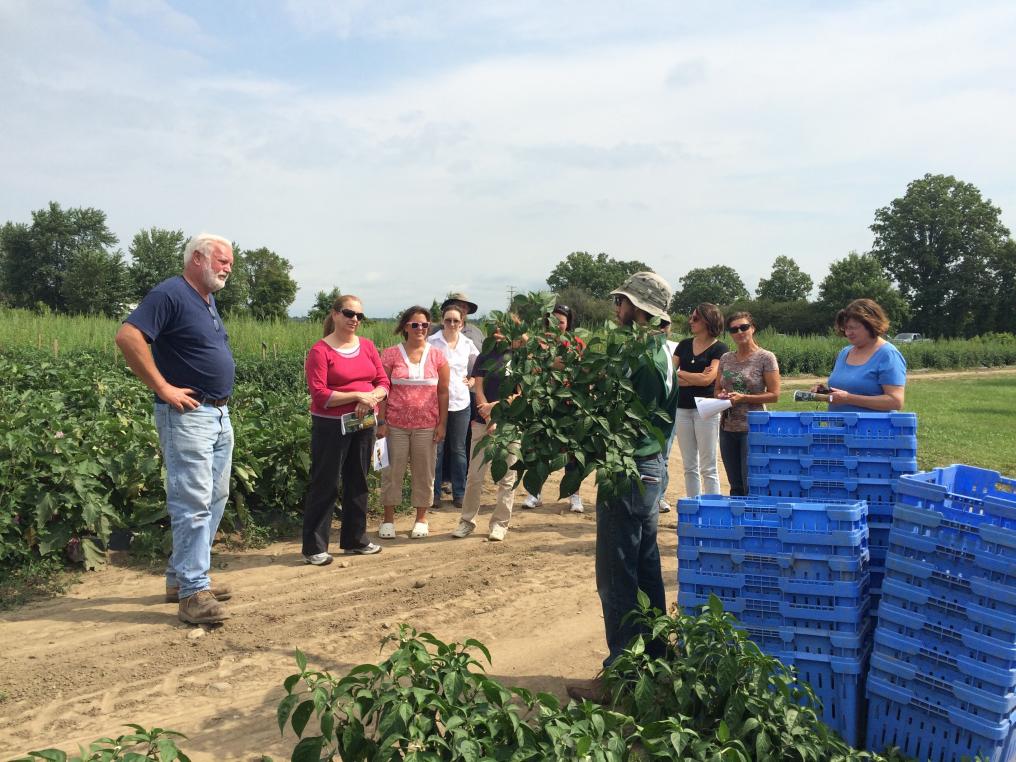Macomb County Pilots Regional Directory to Promote Local Food Purchasing in Schools
Farm to School Directory helps Macomb County Schools access local food!
Directors of Child Nutrition Programs in Macomb and St. Clair Counties have had a desire to increase local food purchasing for years, according to Child Nutrition Consultant, Carolyn Thomas, but lacked the tools needed at the regional level to make it happen. A partnership between the Macomb County Health Department (MCHD), the Macomb Intermediate School District (MISD) and Michigan State University Extension (MSUE) has emerged to address that gap.

Through direct work with local school food service directors, the MISD and MSUE were aware of their desire to purchase more locally produced food. The MCHD uncovered this interest through their recent Community Health Assessment process, through which access to healthy food and increasing the consumption of fruits and vegetables by Macomb residents was elevated as a community priority. This community process provided the momentum for the MCHD to create a locally focused farm to school resource. This spring, the group of partners is debuting a product of their collaboration - a regional Farm to School Directory.
The Farm to School Directory offers school food service directors a list of farms in Macomb County that have stated an interest in and ability to sell directly to schools. The directory is comprised of contact cards with farm names, contact information, hours and the season in which each business operates. The farm specific cards also list payment types that each farm accepts, documentation they can provide and, most importantly, which types of produce they have available for sale. All this information is depicted with user-friendly graphics. The guide features short tutorials on food safety, local procurement, the benefits of farm to school and ideas to implement farm to school programs.
This resource was built on a foundation of many months of outreach to farm businesses. MCHD and MSUE staff called and visited numerous farms to share information about the guide, schools’ desire to purchase more local produce and to request the farmers to list their information, if they were willing and able to sell to schools.
The Macomb County Farm to School Directory has been printed and distributed to interested school food service directors. The intent is that directors will be able to pilot some local purchasing during their Summer Food Service Programs, if they operate them, or at least get familiar with the resource to start or expand local purchasing in the 2019-2020 school year. The timing is important for the release of this guide as it ties in with the recent increase in micro-purchasing threshold to $10,000 in all Child Nutrition Programs. Micro-purchasing is promoted in the guide as the lowest barrier to entry for local purchasing in Child Nutrition Programs. It allows food service staff to purchase food grown in very close proximity to their district’s operations. The resource does not intend to deter food service programs from using other means of procurement, if they want to pursue those avenues. However, this guide intends to illustrate the simplicity of being able to source from a local farmer, demystify the local food procurement process and allow food service directors to feel more comfortable with local food purchasing.
The Macomb Farm to School Directory is modeled on the Oakland County Farm to School Directory, which was developed by the Oakland County Health Division (OCHD). As the Macomb directory was in development, partners worked with the OCHD staff to merge the two directories. The version of the directory that has been printed and will be used is the result of this partnership between the two counties. While this version has been printed and finalized, it is still a work in progress. Macomb and Oakland County partners hope to add more farms to the directory on an ongoing basis and continue to grow the number of local producers who are willing to sell to school districts. Use of the guide will be evaluated to inform improvements and complementary resources or trainings as those needs are identified, from both school food service staff and farm businesses.
All of the partners that developed the guide are looking forward to more local food purchasing in local school districts, and to seeing how this tool could be a model for other counties!



 Print
Print Email
Email


